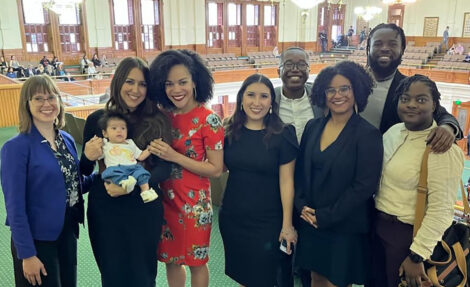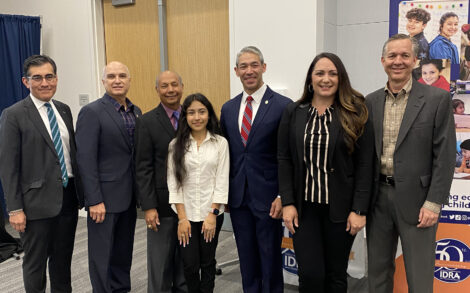• By Celina Moreno, J.D., María “Cuca” Robledo Montecel, Ph.D., Aurelio M. Montemayor, M.Ed. • IDRA Newsletter • April 2023 •
 While we are celebrating IDRA’s 50th anniversary throughout 2023, our founders day is in April. We have compiled a few highlights of our milestone moments. But no highlights reel can ever convey the impact on students’ lives or their families by those who joined us – from our partners and funders, coalitions, educators, public officials, staff and consultants, and community members, to families and students themselves – in a vision of diversity, equity, access, excellence, culture and inherent value that drives us to secure the promise for every student who steps foot into a classroom.
While we are celebrating IDRA’s 50th anniversary throughout 2023, our founders day is in April. We have compiled a few highlights of our milestone moments. But no highlights reel can ever convey the impact on students’ lives or their families by those who joined us – from our partners and funders, coalitions, educators, public officials, staff and consultants, and community members, to families and students themselves – in a vision of diversity, equity, access, excellence, culture and inherent value that drives us to secure the promise for every student who steps foot into a classroom.
First Decade
1973
Following the seminal Rodríguez v. San Antonio ISD ruling by the U.S. Supreme Court, Texans for Educational Excellence (TEE) started with a $95,000 grant to conduct school finance research and advocacy. Dr. José A. Cárdenas, former superintendent of Edgewood ISD of San Antonio who played a key role in the Rodríguez case, became executive director.
IDRA helped write Texas’ first Bilingual Education and Training Act, mandating conditions for bilingual instruction for elementary emergent bilingual students.

(l-r) Aurelio M. Montemayor, Dr. María del Refugio Robledo, Dr. Edward J. Meade, Jr., and IDRA executive director Dr. José A. Cárdenas at an urban dropout prevention collaborative in San Antonio. (June 1988)
1974
With operations outgrowing TEE, Dr. Cárdenas founded the Intercultural Development Research Association (lDRA) in April to expand its school finance and education equity research, facilitate school training and technical assistance, and expand beyond Texas.
1975
IDRA was selected as one of the first federal equity assistance centers (EAC). Our initial center helped schools serve emergent bilingual students in Louisiana and Texas in response to the U.S. Supreme Court’s landmark Lau v. Nichols ruling. IDRA would operate EACs across five decades, including centers focusing on race, gender, national origin equity and religion.
1976
IDRA developed Amanecer, the nation’s first bilingual-bicultural preschool curriculum that incorporated the language and cultural characteristics of young children, parents and teachers.
1978
IDRA provided extensive information for one of the first court cases dealing with the education of undocumented children in Texas, Doe v. Plyler. Dr. Cárdenas served as an expert witness during the trial in Tyler, and IDRA’s Dr. Albert Cortez testified in the Houston and Dallas cases.
IDRA studied the cost of bilingual education in California, Colorado and Utah and studied diversity in hiring in Texas schools.
1979
IDRA established a bilingual training resource center and hosted bilingual training institutes for parents and school administrators.
Second Decade
1984
Since the federal Rodríguez ruling in 1973 failed to lead to serious state action for school finance equity, IDRA convened legal and research experts interested in pursuing state-by-state litigation. Edgewood ISD v. Kirby was filed. IDRA researched funding inequities and reforms needed and provided expert testimony in that and each of the subsequent Edgewood trials.
IDRA launched its Valued Youth Partnership, a cross-age tutoring program to prevent dropouts among youth in at-risk situations.

Dr. Albert Cortez, school finance project director, discusses the progress of the special legislative session at the IDRA board of directors meeting. Pictured with him are (l-r) Jesse Rangel, board member; Craig Foster, property tax project director; and Gonzalo Garza, board member. (August 1978)
1986
IDRA conducted the first study of Texas’ dropout situation including long-range costs and analysis of school programs related to dropout prevention. Findings showed high schools were losing 27% of white students, 34% of Black students and 45% of Latino students. The report led to critical public debate on education reform and mobilized policymakers to change Texas law.
1987
The U.S. Department of Education selected IDRA to operate the desegregation assistance center titled the “South Central Collaborative” to serve the equity needs of school districts in Arkansas, Louisiana, New Mexico, Oklahoma and Texas.
1988
IDRA, along with the National Committee for School Desegregation, co-sponsored the conference, “Little Rock Thirty Years Later: A Commitment to Equity.”
1991
The Texas Legislature’s adoption of a new – still inequitable – state funding system led to a new lawsuit. IDRA conducted equity analyses of 1990 reforms and provided technical assistance and expert testimony in Edgewood II. The
Texas Supreme Court again held the school funding system unconstitutional.
1992
Dr. Cárdenas retired, and Dr. María del Refugio “Cuca” Robledo became his successor.
Third Decade
1995

Valued Youth Partnership program tutor with her three tutees in Atlanta. (2011)
The U.S. Department of Education selected IDRA to operate one of the nation’s 15 comprehensive technical assistance centers. IDRA’s STAR Center served schools in Texas for 10 years, improving teacher capacity to serve emergent bilingual students and migrant students as well as identifying critical characteristics of high-poverty, high-performing schools.
Dr. Cárdenas’ textbook, Multicultural Education: A Generation of Advocacy, was published.
The IDRA Valued Youth Partnership was featured in Everybody’s Business: America’s Children, an NBC television special hosted by the Today Show’s Katie Couric.
1996
IDRA, in cooperation with the National Coalition of Advocates for Students (NCAS), launched its annual school opening alert campaign to reaffirm the legal rights of all children who reside in the United States to attend public schools, regardless of immigration status.
IDRA presented testimony before the President’s Advisory Commission on Educational Excellence for Hispanic Americans on school finance equity and school holding power.
1997
Leading more than 70 individuals and organizations, IDRA released a “Children First” declaration in response to the Texas Supreme Court decision in Edgewood vs. Meno, which said Texas’ school funding system was equal enough. Our declaration rejected the court’s judgment and affirmed our commitment to work toward a truly equitable school funding system.
Dr. Cárdenas’ textbook, Texas School Finance Reform: An IDRA Perspective, was published.
1998
IDRA launched a U.S.-Mexico binational and interdisciplinary program for teacher preparation and leadership development.
2000
IDRA established its first parent information resource center. This Texas center was part of the U.S. Department of Education’s efforts to bring together parents, schools, universities, community organizations and businesses to support underserved students.
2001
IDRA founded the Texas Latino Education Coalition (TLEC) to improve public education for Latino children, focusing on fair funding, teaching quality, school holding power, and college access and success. Co-founders included Mexican American Legal Defense and Educational Fund (MALDEF), Mexican American School Board Members Association, and LULAC, among others. The coalition later changed its name to Texas Legislative Education Equity Coalition (TLEEC) and, in 2015, began holding education days of action every legislative session at the Texas Capitol.
Fourth Decade
2003
IDRA’s celebrated its 30th anniversary.
IDRA held its 10th Annual IDRA La Semana del Niño Early Child Educator’s Institute™, offering professional development on valuing linguistic and cultural assets that student diversity brings.
2004
IDRA launched an initiative, Fulfilling the Legacy of Mendez and Brown, to focus on the implications of Brown v. Board of Education (1954) and its predecessor Mendez v. Westminster (1947) for Black and Latino students and to catalyze a national action agenda for reform.
IDRA’s Valued Youth Partnership celebrated its 20th anniversary as a leader in dropout prevention. The program has kept 98% of its tutors in school.
2005
IDRA’s annual Texas public school attrition study reached its 20th year. During the previous 15 years, the statewide attrition rate in Texas was higher than the initial rate of 33% in the landmark study. The statewide attrition rate was 36% in 2004-05.
2006
IDRA launched IDRA Classnotes, a podcast series designed for educators serving diverse students and to provide insights into key educational issues in the United States.
2007
The U.S. Department of Education released a publication, Engaging Parents in Education, that profiled IDRA’s groundbreaking family engagement work emphasizing the power of strong parent-educator partnerships to improve schools and raise academic achievement.
2009
IDRA celebrated the 25th anniversary of its Valued Youth Partnership and its 10th anniversary in Brazil. Anchored in this transnational experience, IDRA’s publication, Continuities – Lessons for the Future of Education, vividly captured seven key lessons for improving the quality of education for all students. In 2015, the White House named the program a Hispanic education “Bright Spot,” featuring it in its list of highly-effective programs.
2010
IDRA published Courage to Connect: A Quality Schools Action Framework, a theory of change model based on experience and empirical evidence for assessing a school’s conditions and outcomes, identifying leverage points for improvement, and informing action.

Families in IDRA’s Education CAFEs in south Texas share IDRA Semillitas de Aprendizaje storybooks with their children. (2012)
IDRA launched its Semillitas de Aprendizaje bilingual early childhood curriculum to address the needs of young emergent bilingual students.
2011
IDRA founder Dr. José A. Cárdenas passed away on September 17, 2011.
2012
IDRA presented trial testimony in Texas Taxpayer and Student Fairness Coalition vs. Michael Williams, et al., based on expert reports IDRA prepared for the group of plaintiffs represented by MALDEF. IDRA analysis showed that the school finance system was inequitable, and it underfunded bilingual education and the education of students in families with low incomes.
Fifth Decade
2013
IDRA collaborated with Native American tribes in Oklahoma to support language preservation by translating children’s books for learning key concepts. The project built on IDRA’s Semillitas de Aprendizaje materials.
2014
IDRA wrote a report for the San Antonio Hispanic Chamber of Commerce, “The Impact of Education on Economic Development in Texas,” linking quality education and economic vitality.
IDRA held a bilingual convening with families, advocates, superintendents and educators representing 16 districts to share the results of our joint study with IDRA Education CAFEs and the Rio Grande Valley Equal Voice Network to understand awareness around and impact of the state’s new weakened high school graduation requirements under House Bill 5 (2013). The study was based on a survey, administered door-to-door, to more than 1,600 parents and community members with children in 24 public schools across 30 cities and towns in the Rio Grande Valley. The survey and convening made way for policy change in 10 districts that increased graduation expectations, beyond the new state requirements.
2015
At its school funding symposium, IDRA featured its inaugural recipient of the Dr. José A. Cárdenas School Finance Fellowship, which IDRA established in 2013 to honor the memory of its founder.
2016
IDRA expanded its family leadership in education initiative, IDRA Education CAFE™ (Community Action Forums for Excellence). Education CAFEs build bridges between families, educators and communities and help schools provide an equitable education rooted in, renewed by, and responsive to their neighborhoods and communities.
The U.S. Department of Education restructured its EAC regions and selected IDRA to operate the IDRA EAC-South from 2016 to 2022 to serve schools in 11 states and the District of Columbia to develop local capacity in the region among the nearly 3,000 school districts and 29,632 schools with over 1 million educators and 16 million students. This expanded region was especially significant to equity efforts as 97% of the active desegregation cases in the country were in the U.S. South.
In one of an annual series, IDRA conducted evaluations of 57 USDA, National Institute of Food and Agriculture, Hispanic-Serving Institutions Program projects in Arizona, California, Illinois, Michigan, New Mexico, New York, Puerto Rico, Texas and Washington.
2017
Through its STAARS Leaders project, IDRA increased leadership effectiveness in partnership with San Antonio ISD by providing school leaders with coaches and differentiated and comprehensive professional development and technical assistance.
In one example of IDRA’s assistance to schools to improve diversity in recruitment and hiring, IDRA reviewed the policies and practices of an Alabama district under federal court order. Our research-based guidance led the district to improve practices and hire additional Black faculty.
2018
IDRA released a 15-year synthesis of its Transition to Teaching Program. IDRA partnered with universities and over 55 school districts across Texas to prepare a new generation of skilled, effective teachers to lead and innovate in schools that needed them most. IDRA recruited over 800 recent graduates and mid-career professionals working in fields other than teaching.
IDRA held its 20th Annual La Semana del Niño Parent Institute, continuing to provide a space and guidance for families to help each other advocate equitable and excellent schools.
IDRA studied the impact of Texas’ weakened graduation requirements adopted in 2013 (HB 5), finding that Algebra II enrollment in rural school districts dropped 24%.
2019
Dr. María “Cuca” Robledo Montecel retired as President & CEO after 26 years in that position and became president emerita. Celina Moreno, J.D., became IDRA’s third CEO in February.
IDRA established a partnership with Mexico by providing community education in the Consulate of Mexico in San Antonio to help Mexican families navigate the U.S. education system.
IDRA began Texas operations of the international Chief Science Officer program that empowers middle and high school students to enrich school STEM culture and career awareness.
IDRA co-hosted Walkout! National Chicano Student Walkouts Conference and began co-organizing biannual teacher academies on Mexican American Studies.
IDRA convened 500 educators and advocates in Broward County, Florida, home of the recent Parkland school shooting (one of the deadliest in history), to examine equity and school safety.
2020
IDRA switched to a hybrid work environment due to the COVID-19 pandemic.
With nationwide school closures, IDRA released the weekly “Learning Goes On,” with policy updates, data maps and an educator webinar series on equitable practices for online learning. IDRA initiated a digital equity campaign in Texas that led to policy change during the 2021 Texas Legislature, created a partnership to connect college graduates with parents to navigate virtual K-12 classrooms, and distributed Semillitas de Aprendizaje to students without Internet access.
IDRA created a Georgia team to focus on state and regional policy and community advocacy and address consistent education trends across the U.S. South.
IDRA co-facilitated, with the Virginia Department of Education, the Virginia Commission on African American History Education, which released a report to revise curriculum standards and teacher training so the state’s history courses better reflect the contributions of Black people.
IDRA launched its Education Policy Fellowship to improve racial equity in policymaking and provide real-world training on legislative advocacy, coalition-building and crafting community-centered education policy agendas with families. The program is now in Texas and Georgia.
2021
IDRA and Texas A&M University-San Antonio launched VisionCoders, a program that develops area middle school students in at-risk situations into the next generation of software coders.
IDRA led a statewide campaign in Texas and Georgia to combat classroom censorship and created a new resource, “Knowledge is Power,” for advocates and educators. We founded Georgia Coalition Against Classroom Censorship that later became the Georgia Coalition for Education Justice and a similar coalition in Texas. Coalition members testified and held community sessions and news conferences to support culturally-sustaining schools and policy.
IDRA partnered with and leads the Alamo STEM Ecosystem, a county-wide community of practice including K-12, higher education and industry leaders with a commitment to providing STEM experiences for students, focusing on those traditionally underrepresented in STEM.
IDRA co-led the Texas Early Childhood English Learner Initiative to develop a Texas bilingual education policy roadmap. We generated family and educator input leading to state laws, including requiring development of a statewide plan for long-term support of emergent bilingual students.
2022

In the gallery of the Texas Senate, when on March 1, 2023, the Texas Senate recognized IDRA’s 50 years of work for education equity. (l-r) Chloe Latham Sikes, Ph.D., deputy director of policy; Celina Moreno, J.D., IDRA president & CEO, with her baby,Yazmín Moreno Del Toro; Morgan Craven, J.D., national director of policy, advocacy and community engagement; Diana Long, education policy fellow; Thomas Marshall III, M.Ed., policy communications strategist; Paige Duggins-Clay, J.D., chief legal analyst; Steve Kemgang, education policy fellow; Alisha “Tuff” Tuff, education policy fellow.
IDRA’s recently-established federal policy team testified before the U.S. Congress on school discipline and later, after the school shooting in Uvalde, on school safety for all students.
IDRA established a legal team. Early work included Supreme Court amicus advocacy on affirmative action cases and against diverting public funds to private schools. Leading a business-student-higher education coalition to protect the Texas Dream Act, IDRA filed an amicus brief in the Fifth Circuit against a suit intended to upend Texas tuition laws. IDRA, with its partners, filed Office for Civil Rights complaints against classroom censorship and book bans, racial bullying, and discrimination against LGBTQ+ children in Texas schools.
IDRA launched SEEN (Southern Education Equity Network) to connect and support families and community advocates throughout the U.S. South. As part of SEEN’s virtual platform, IDRA launched the “We All Belong – School Resource Hub” to promote accurate and inclusive education by providing lesson plans and tools for teaching history and current events about race and gender in today’s classroom censorship climate.
IDRA helped shape Texas’ new bilingual special education certification, which IDRA helped establish through its advocacy in the 2021 Texas legislative session.
IDRA and partners published an analysis with guidance to assure educators and communities that Virginia’s Anti-Equity Executive Order 1 does not require schools to censor curriculum.
The IDRA EAC-South released new online toolkits for educators on culturally-responsive instruction, ethnic studies, emergent bilingual education, school discipline, STEM access, college readiness, interrupting bullying and harassment in schools, LGBTQ+ equity, digital equity and diverse hiring. (See https://idra.news/TApackages)
2023 – So far
IDRA held a National Youth Summit organized by IDRA’s inaugural Youth Advisory Board, comprised of 10 Texas high school students whose insight informs our priorities and programs.

Community launch event for IDRA’s federal Defense STEM Education Consortium (DSEC) hub. (l-r) Dr. Michael Flores, Alamo Colleges Chancellor; Joe Sánchez, Cyber Texas President; Dr. Raul Reyna, founder, Alamo STEM Ecosystem; Alicia de Hoyos, IDRA STEM youth leader & student at South San Antonio ISD; San Antonio Mayor Ron Nirenberg; Dr. Stephanie Garcia, IDRA STEM and gender equity education specialist; and Alamo STEM Ecosystem lead; and Dr. Cliff Zintgraff, chief learning officer, SAMSAT. (2023)
Under IDRA’s leadership, San Antonio became the nation’s fourth federal Defense STEM Education Consortium (DSEC) hub to build a STEM career pipeline for the city’s students.
IDRA launched Youth Leadership Now, a federal innovation research project in West Texas and New Mexico that combines elements of our Valued Youth Partnership program, our Education CAFE intergenerational family leadership model, and student-led equity action projects.
IDRA and its allies blocked legislation that would expand Georgia’s school voucher program.
IDRA commemorated the 50th anniversary of Rodríguez v. San Antonio ISD with a national symposium.
IDRA celebrates its 50th anniversary.
Celina Moreno, J.D., is President & CEO of IDRA. Comments and questions may be directed to her via email at contact@idra.org. María “Cuca” Robledo Montecel, Ph.D., is president emerita of the IDRA. Comments and questions may be directed to her via email at contact@idra.org. Aurelio M. Montemayor, M.Ed., is IDRA’s family engagement coordinator and directs IDRA Education CAFE work. Comments and questions may be directed to him via email at aurelio.montemayor@idra.org.
[©2023, IDRA. This article originally appeared in the April 2023 IDRA Newsletter by the Intercultural Development Research Association. Permission to reproduce this article is granted provided the article is reprinted in its entirety and proper credit is given to IDRA and the author.]


